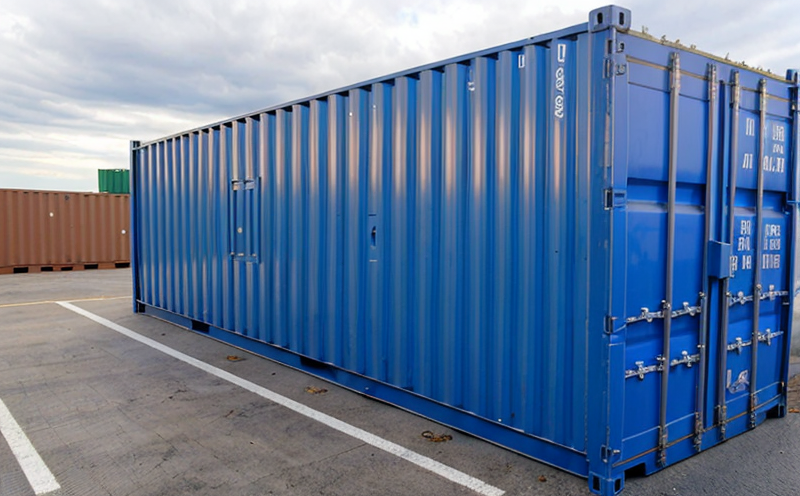ASTM D2240 Hardness Shore D Testing of Plastic Containers
The Shore hardness test, specifically ASTM D2240-21, is a critical method used to measure the indentation hardness of plastic materials. This test is particularly important for assessing the durability and performance of containers made from polymeric materials in various industries such as packaging, automotive, and consumer goods. The Shore hardness scale provides a quantifiable measure that helps ensure consistency and quality across different manufacturing batches.
For plastic containers, this test is essential because it gives insights into how resistant the material will be to external forces like pressure or impact. This information is crucial during product design phases as well as in quality control processes. By understanding the Shore hardness of a plastic container, manufacturers can optimize their materials and production techniques to meet specific application requirements.
The testing process involves using a Shore D hardness tester, which applies force uniformly across the surface of a specimen cut from the container. The depth of indentation is then measured, and this value is used to determine the Shore hardness number according to ASTM D2240-21 standards. It's important that specimens are prepared correctly; they should be free from defects or inconsistencies that could skew results.
Interpreting these test results allows engineers and product developers to make informed decisions about material selection, optimize processing conditions, and predict long-term performance of plastic containers under real-world usage scenarios. For instance, higher Shore hardness values indicate greater resistance to deformation, which is beneficial for items subjected to high-pressure environments or frequent handling.
Understanding the relationship between Shore hardness and other properties such as tensile strength or impact resistance can also help in tailoring materials more precisely according to end-user needs. This knowledge is vital not only during research and development but also when addressing regulatory compliance issues related to product safety standards.
The ASTM D2240-21 standard ensures consistency across laboratories by providing detailed guidelines on sample preparation, testing procedures, and data interpretation. Compliance with this standard guarantees accurate measurements that are comparable between different facilities, fostering trust among stakeholders involved in plastic container manufacturing processes.
Applied Standards
| Standard Number | Description |
|---|---|
| ASTM D2240-21 | This standard specifies the procedure for determining the hardness of plastic materials using a Shore D hardness tester. It covers all types of thermoplastic and thermosetting plastics that can be tested with this instrument. |
| ISO 868:2015 | An international standard equivalent to ASTM D2240, providing similar methods for testing the hardness of plastic materials. This harmonization ensures compatibility between U.S. and European laboratories. |
| EN ISO 868-1 | European version of the Shore hardness test applicable to various polymers including those used in packaging containers. It emphasizes the importance of standardized testing protocols for consistent results across borders. |
| IEC 6048-2:2015 | Incorporates the Shore D scale into electrical safety regulations where plastic parts are involved, ensuring that these components meet stringent mechanical performance criteria before being approved for use in consumer electronics or medical devices. |
Industry Applications
In packaging, determining the Shore hardness of containers helps ensure they can withstand stacking pressures without compromising structural integrity. Automotive manufacturers rely on this test to evaluate the resilience of fuel tanks and other components exposed to harsh environmental conditions.
Consumer goods companies use ASTM D2240 testing to develop durable products like luggage or sports equipment that must endure rigorous handling during shipping and storage. Additionally, medical device firms employ these tests to ensure that devices made from plastic materials meet stringent biocompatibility requirements while maintaining robustness against accidental impacts.
The results obtained through ASTM D2240 hardness testing play a pivotal role in ensuring product safety and reliability throughout the supply chain. By adhering to this standard, manufacturers can confidently produce high-quality plastic containers that comply with international regulations and meet customer expectations.
Why Choose This Test
The Shore D hardness test offers several advantages when evaluating plastic containers:
- Predictive Capability: Understanding how a material will behave under various conditions allows for better prediction of its longevity and performance over time.
- Consistency Across Batches: Ensuring consistent quality within each batch ensures uniform product characteristics, enhancing customer satisfaction.
- Regulatory Compliance: Adherence to industry standards like ASTM D2240-21 helps avoid legal disputes and recalls due to non-compliance issues.
- Rapid Prototyping: Early-stage testing can quickly identify material candidates that meet design specifications, speeding up development cycles.
Moreover, this test provides valuable insights into the mechanical properties of plastic containers, helping to optimize manufacturing processes and improve overall product quality. The ability to compare results across different batches or suppliers fosters competitiveness within the market by allowing companies to benchmark their offerings against industry leaders.





